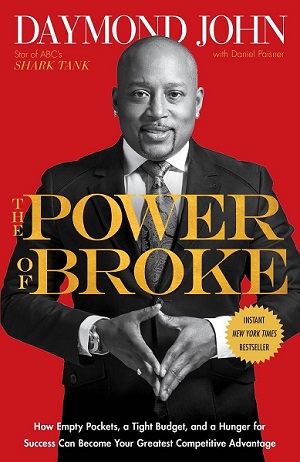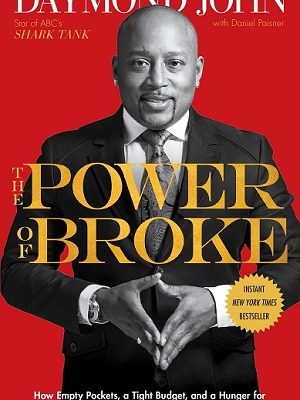Daymond John’s The Power of Broke is a motivational and practical guide that teaches readers how starting with limited resources can be the key to building a successful business. John, best known as the founder of the FUBU clothing brand and a star on Shark Tank, uses his own story along with others’ experiences to explain how being broke can foster creativity, resilience, and drive, ultimately giving entrepreneurs a competitive edge. Below are the lessons from book:

Read: Rich Dad Poor Dad
Lesson 1: The Power of Broke Mentality
The core idea behind The Power of Broke is that having limited resources—money, connections, or opportunities—forces you to be more resourceful, creative, and innovative. When you have nothing to lose, you’re more willing to take risks and find unconventional ways to succeed.
- Key Takeaway: Scarcity breeds innovation. Limited resources force you to be scrappy, resourceful, and creative, which can ultimately lead to success.
- Application: Instead of seeing financial limitations as an obstacle, embrace them as an opportunity to think outside the box and find creative solutions.
Lesson: The “power of broke” is about harnessing the hunger and hustle that come from being under-resourced, using it to fuel your determination and creativity.
Lesson 2: Start with What You Have
John emphasizes that you don’t need to wait until you have enough money, resources, or connections to start working toward your goals. In fact, starting from where you are, with what you have, can be the most effective way to get moving.
John’s own story is a testament to this. He started FUBU with no financial backing, making hats by hand in his mother’s house and selling them on the streets. He leveraged his limited resources and made the most out of small opportunities.
- Key Takeaway: You already have what you need to start. The most important thing is to take action and build momentum, even if it’s on a small scale.
- Application: Identify the resources, skills, and relationships you already have, and begin leveraging them to move forward. Don’t wait for the “perfect” time to start.
Lesson: Success is not about waiting for the right circumstances; it’s about taking action with what you have right now.
Lesson 3: The Importance of Hustle and Grit
Daymond John stresses the importance of having a relentless work ethic, or “hustle.” He points out that when you don’t have a lot of money or resources, you need to compensate with hard work, persistence, and tenacity.
Many successful entrepreneurs, including John himself, didn’t start with huge financial backing or easy access to capital. They made up for it by outworking the competition and staying committed even when things got tough.
- Key Takeaway: Hustle and grit can outweigh financial resources. When you work harder and smarter than others, you give yourself a competitive advantage.
- Application: Develop a work ethic that is consistent and focused. Be willing to put in the extra hours, make sacrifices, and push through obstacles to achieve your goals.
Lesson: Success comes not just from talent or resources but from hustle, persistence, and determination.
Lesson 4: Creativity Comes from Constraints
Having limited resources forces you to become more creative. John explains that when you’re broke, you can’t rely on traditional methods or big-budget solutions. Instead, you have to think creatively, find new ways to market, and take advantage of low-cost opportunities.
For example, John used guerrilla marketing tactics to promote FUBU, getting celebrities to wear his clothing without paying large endorsement fees. This innovative approach helped him build a brand with limited resources.
- Key Takeaway: Constraints breed creativity. When you don’t have the luxury of money, you’re forced to come up with innovative ways to solve problems and grow your business.
- Application: Embrace constraints as a way to spark your creativity. Look for unconventional, low-cost methods to achieve your goals, and think outside the box.
Lesson: Financial constraints force you to find creative solutions and become more innovative in your approach.
Lesson 5: Leverage Social Media and Community Support
One of the key advantages of the “power of broke” in today’s world is the ability to leverage social media and community support. John emphasizes that building an audience on platforms like Instagram, Facebook, and Twitter can be done with little to no money, making it accessible to anyone.
By engaging with your audience, offering valuable content, and building genuine relationships, you can grow your brand and your business organically.
- Key Takeaway: Social media allows you to market and grow your brand with minimal financial investment. Building relationships and offering value to your community can create powerful, organic growth.
- Application: Use social media to connect with your audience, share your story, and build a community around your brand. Consistency and authenticity are key to growing your presence online.
Lesson: Social media is a powerful, low-cost tool that allows you to connect with customers and build your brand without a big marketing budget.
Lesson 6: Build Relationships, Not Transactions
John stresses the importance of building meaningful relationships rather than just focusing on transactions. In the early stages of FUBU, John didn’t have the money to pay for expensive endorsements, but he built relationships with key influencers who helped him promote his brand.
Whether it’s with customers, investors, or influencers, relationships are the foundation of long-term success. Fostering genuine connections will serve you far better than focusing on immediate financial gain.
- Key Takeaway: Relationships are more valuable than quick transactions. Building trust and long-term partnerships will benefit you in the long run.
- Application: Focus on providing value and building strong, authentic relationships with people in your industry or customer base, even if there’s no immediate financial return.
Lesson: Success comes from building meaningful relationships, not just from making quick sales or profits.
Lesson 7: Be Relentless in Your Pursuit of Knowledge
Daymond John emphasizes that one of the keys to success is being a lifelong learner. The power of broke is not just about financial limitations—it’s also about the hunger for knowledge and the willingness to continually learn and adapt.
John shares how, despite his lack of formal education in fashion or business, he constantly sought out knowledge through books, mentors, and hands-on experience. This willingness to learn and grow was a critical factor in his success.
- Key Takeaway: The most successful people are those who are always learning and evolving. Stay curious, seek out knowledge, and be open to new ideas.
- Application: Invest in your personal and professional growth by reading, taking courses, and seeking mentorship. Never stop learning, regardless of how much success you achieve.
Lesson: Continuous learning and self-improvement are essential to staying competitive and growing your business.
Lesson 8: Focus on Solving Problems
Another key lesson from The Power of Broke is the importance of focusing on solving problems. Daymond John explains that successful entrepreneurs are those who find ways to solve problems for others, whether it’s through a product, service, or innovation.
FUBU was successful because it solved a problem—there was a lack of fashionable streetwear that resonated with a particular demographic. By addressing this need, John was able to create a strong connection with his audience.
- Key Takeaway: The most successful businesses solve real problems for their customers. When you focus on meeting the needs of others, success follows.
- Application: Identify the problems or pain points that your target audience faces, and offer solutions that address those issues in a meaningful way.
Lesson: Success comes from solving problems for others. Focus on how you can provide value and meet the needs of your audience.
Lesson 9: The Importance of Authenticity
John emphasizes that authenticity is crucial when building a brand or business. People are drawn to those who are genuine, and trying to be something you’re not will ultimately backfire. Whether it’s in your marketing, branding, or personal relationships, being authentic builds trust and credibility.
FUBU succeeded because it was authentic to its roots in hip-hop culture. John wasn’t trying to be something he wasn’t—he was building a brand that reflected his own identity and the values of his community.
- Key Takeaway: Authenticity builds trust and credibility. Being genuine in your approach will attract people to your brand and help you stand out in a crowded marketplace.
- Application: Stay true to your values, your story, and your identity. Don’t try to copy others—focus on what makes you and your brand unique.
Lesson: Authenticity is key to building a strong, credible brand that resonates with your audience.
Lesson 10: Embrace Failure as a Learning Opportunity
Lastly, John discusses the importance of embracing failure. Failure is inevitable in business and life, but how you respond to it determines your ultimate success. Rather than being discouraged by setbacks, see them as opportunities to learn and grow.
John shares how he faced numerous failures and challenges while building FUBU, but each failure taught him valuable lessons that helped him improve and succeed in the long run.
- Key Takeaway: Failure is a natural part of the journey to success. Embrace it, learn from it, and keep moving forward.
- Application: When you experience failure, take time to reflect on what went wrong, learn from the experience, and apply those lessons to your next attempt.
Lesson: Failure is not the end—it’s a learning opportunity that can lead to future success if you stay persistent and adaptable.
Conclusion
The Power of Broke teaches that financial scarcity can be your greatest asset if you adopt the right mindset. By leveraging creativity, hustle, relationships, and authenticity, you can turn limitations into advantages that drive innovation and success. Daymond John’s story and the examples he shares show that success isn’t about having unlimited resources—it’s about using what you have to the fullest (Amazon).



